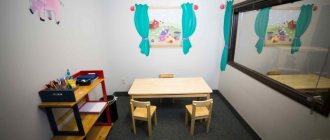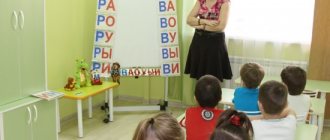The opportunity to work with children, in a quiet and comfortable office, with a stable, albeit small, salary - often speech therapists come into the profession with precisely these goals. But idealization at the start of your career can lead to disappointment in the future. Not everyone should choose this profession, says speech therapist teacher Vita Bilukha . Only by vocation and only to people whose desire to help others prevails over all others.
What features of the profession do young specialists learn about when starting their first job? What are the pros and cons? How much can you earn in the public and private sectors? And where to study to become a speech therapist after grades 9 and 11? We answer these questions in the FAN .
photo from the personal archive of Vita Bilukha /
What does a speech therapist do?
It is believed that specialists work only on sound pronunciation, that is, they teach children to pronounce sounds correctly, not to “lisp” or “burr.” In fact, the sphere of competence of a speech therapist is much broader, as is the concept of speech disorders. These include problems with speaking, reading and writing, voice disorders, stuttering, delayed speech development or its complete absence.
Each of these disorders has a reason, and the speech therapist’s task is to identify it. Speech is like a litmus test for human health, not only physical, but also mental. Its disorders may be associated with problems with hearing or the speech apparatus, or may result from more serious illnesses: mental, neurological. To assess what exactly caused the speech defect, a specialist must have a huge knowledge base in the field of anatomy, physiology, neurology, and psychology. Therefore, it is no coincidence that speech therapy is called a science at the intersection of medicine and pedagogy.
“A speech therapist helps develop literate speech,” explains speech therapist Vita Bilukha, “this means the formation and modification of words, the creation of grammatical structures. Helps develop coherent speech: the ability to correctly express one’s thoughts, compose stories from pictures, and retell texts. The specialist works on the child’s fine motor skills by performing a finger massage or inviting the child to play finger games. Teaches reading and literacy, diction and intonation, melody and tempo of speaking. Helps develop hearing and speech perception.”
Most often, specialists work with children - in kindergartens, schools, boarding schools, and clinics. But it is a mistake to consider a speech therapist exclusively a children's specialist. Even an adult can turn to a professional to eliminate speech defects. And they will help him too: you can make your speech beautiful, clear and coherent at any age.
A separate category of speech therapists is people after strokes. Speech restoration becomes one of the stages of rehabilitation and a way to return to a full life.
In simple terms about speech therapy
Portrait of a modern speech therapist
A modern speech therapist uses methods and techniques from other related areas in his work. The result of such mixing is many times higher and faster than with classical work.
So what does a speech therapist who keeps up with the times use and rely on in his work?
✔ Taping. Tapes are special “breathable” elastic bands. They improve the functioning of the muscles of the speech apparatus without limiting their movements.
✔ Kinesiotherapy is an effective system of influencing impaired psychomotor and sensory functions of a person with special motor exercises in combination with music and words. This includes speech therapy rhythms, finger and articulation gymnastics.
✔ Various types of massage: self-massage, probe, acupressure.
✔ Breathing practices: Strelnikova’s breathing exercises, Frolov’s simulator, etc.
✔ Interactive and multimedia tools, computer programs, training and development platforms.
✔ Neuropsychological techniques are a set of special techniques aimed at restructuring impaired brain functions and developing interhemispheric connections.
✔ Aromatherapy is a fragrant way to maintain and improve your health.
✔ Ergotherapy is a special therapeutic exercise aimed at training fine motor skills and coordination using various simulators and game tasks.
✔ Methods of imagotherapy (a type of psychotherapy). Here are its most popular directions:
• theater therapy;
• puppet therapy;
• fairytale therapy;
• sand therapy.
✔ Su-jok is an effective method of prevention and restoration of certain body functions by influencing reflex points of the hands and feet.
✔ Chromotherapy is the effect of the color spectrum on a person’s psycho-emotional state.
✔ Osteopath, psychologist, neuropsychologist - specialists from related sciences. A smart speech therapist will definitely cooperate with them.
✔ An orthodontist, an ophthalmologist, a neurologist, an otolaryngologist are doctors whose diagnoses a good speech therapist takes into account.
~~~~~~~~~~~~~~~~~~~~~~~~~~~~~~~~~~~~
The first speech therapists appeared in the 17th century in Europe. Their job was to help children with hearing impairments pronounce sounds correctly and put them into words. At that time, it was mistakenly believed that speech defects needed to be treated with medications and not with exercises. In the second half of the 19th century, speech therapy became an independent science and official speech specialists appeared - speech therapists.
~~~~~~~~~~~~~~~~~~~~~~~~~~~~~~~~~~~~
Speech therapist work in kindergarten and school
“Every year the percentage of children who need speech therapy help is growing,” the expert notes. “And the later the defect is discovered, the more serious negative consequences it can have for the child’s development. Therefore, the task of a specialist working in a kindergarten is to promptly identify and prevent speech disorders in children of senior preschool age.”
In kindergartens, specialists are responsible for the development of coherent speech skills in children and the complete formation of its sound side. In other words, they teach children to hear and perceive sounds correctly, and then reproduce them correctly. They work with children individually and in groups.
In ordinary kindergartens, attention is paid only to those children who require professional help. And in specialized institutions and groups with a speech therapy focus, they are responsible for the entire educational process, building it in such a way as to help children get rid of speech problems as early as possible.
Be sure to involve parents in the work, provide consultation, and recommend correction techniques that can be used at home. If the speech therapist believes that the cause of the defect is a disease, he will recommend that the parents show the baby to a doctor - a specialized specialist. This approach helps eliminate the disorder at an early age or minimize its negative impact on the child’s development and speech.
Specialty "teacher-speech therapist"
In schools with children who are not doing well with speech, speech therapists work. Their task does not change, but it becomes more important. If a child does not perceive sounds correctly, he will usually have problems with literacy and writing. It is more difficult for him to study, remember material, and concentrate on the teacher’s words. Without correctional support, the school curriculum becomes an insurmountable obstacle for him, so it is imperative to correct violations with the help of a specialist.
“The tasks of a speech therapist at school are to promptly identify and correct speech disorders in students,” explains Vita Bilukha. “This helps to overcome difficulties that a child may have during the learning process.”
pixabay.com/
Specialty "defectologist-speech therapist"
Among speech therapists, there is a separate group of professionals who work with “special” children: toddlers and schoolchildren with intellectual disabilities. Such specialists are called defectologists: their qualifications allow them to correct defects in speech, writing, and communication skills in children with disabilities in physical and mental development.
Parents of children who have hearing and vision problems, developmental delays, memory and attention disorders, autism and cerebral palsy, and mental retardation turn to such specialists. A defectologist, of course, is not able to rid a child of the cause of the disease, however, thanks to correctional assistance, it is possible to improve the speaking and pronunciation skills of “special” children and help them communicate with loved ones and peers.
In his work, a defectologist closely interacts with doctors who “manage” the child: a pediatrician, a neuropsychiatrist. In specialized institutions, a defectologist, psychologist, and social teacher work with children at the same time. The tasks of specialists vary, but they have the same goal - to improve the quality of life of the patient under their care.
Classes with a speech therapist. Materials and notes.
Contained in sections:
- The work of a speech therapist. Speech therapy 8270
Includes sections:
- Differentiation and automation of sounds 4048
By groups:
- Senior group
- Preparatory group
- Middle group
- Junior group
Showing publications 1-10 of 9440. All sections | Speech therapy classes
New
Photo
The best
Summary of a speech therapy lesson in the junior group “Toys” Lesson 1 Topic : “Toys (acquaintance)
» Objectives: 1. Clarify and expand the vocabulary on the topic.
2. Form a generalizing concept of “toy”
.
3. Learn to build a phrase from 2 words. 4. Develop attention and memory. 5. Develop the ability to listen to the words of a speech therapist , follow simple instructions, carefully...
Notes of a logorhythmics lesson in a senior speech therapy group “Hello, autumn, hello, forest, full of fairy tales and miracles” Notes of a logorhythmics lesson in a senior speech therapy group . Topic: “Hello, autumn, hello, forest full of fairy tales and miracles!”
Objectives: 1. Development of spatial orientation. 2. Development of coordination of speech with movement. 3. Development and activation of attention. 4. Development...
Features, pros and cons of the profession of speech therapist
“In their work, a specialist needs to show great patience and restraint,” notes teacher-speech therapist Vita Bilukha. — It is important to have goodwill, communication skills, and intuition. Observation and perseverance, flexibility of mind are required. After all, often the presentation of material has to be rearranged on the fly: you expect one thing, but have to work with another.”
One of the main difficulties of the profession is the need to work with “difficult” children. Without a sincere desire to help, to go through a long path of correction step by step, patience - it is very difficult to cope with the psychological load. Another significant disadvantage is the huge number of documents that a specialist must maintain when working in a budget institution. They either get used to this or go into private practice, where the specialist determines the scope of reporting for himself.
How many hours does a speech therapist work?
The standard work rate in a budget institution is 20 hours a week, that is, a speech therapist works 4 hours a day. This is one of the advantages of the profession: such a schedule allows you not to get tired or overloaded. There is always time left for personal matters, and if you wish, you can engage in private practice in your free time.
How long is a speech therapist's vacation?
Long vacations are another plus of the profession. Its duration is 56 days. And since specialists work in schools or kindergartens, where the educational process lasts from September to May, vacations always fall only in the summer months, which is also convenient.
pixabay.com/
How much does a speech therapist earn?
The salary level does not differ from the usual in the public sector. Depending on the region and place of work, a specialist can count on 17–20 thousand rubles per month. The average salary of a speech therapist in a school is usually higher than in a kindergarten.
“A speech therapist has no career growth as such,” clarifies Vita Bilukha. “But now more and more specialists are going into private practice. Those who have self-discipline and organizational character can achieve good results. In this case, the specialist himself sets the hourly wage.”
According to the expert, only those who like to feel the usefulness of their work and who want to help people become healthier and happier can successfully realize themselves in the profession. And only in second place in importance should come short working hours and long vacations. In this case, the person will enjoy his work.
Objectives of an individual lesson
| Educational objectives | Formation of the concept of the mechanism of sound formation and its acoustic features; formation or consolidation of knowledge about a syllable, a word, a sentence; consolidation of the dictionary or clarification of words containing a given sound on a lexical topic (this could be “Toys”, “Autumn”, “Shoes”, etc.) |
| Corrective tasks | Development and improvement of articulatory motor skills; formation of rules for oral exhalation taking into account this phoneme; development of phonemic hearing and voice; formation of conditioned reflex connections to a given articulatory-acoustic image |
| Educational tasks | Correction of the child’s personality as a whole. |
Below, I would like to present to you, dear colleagues, the structure of an individual lesson.
The structure of an individual lesson at the stage of sound production
- Organizing time
- Articulation exercises: general articulation exercises, special articulation exercises, exercises to develop the strength of the voice and exhalation.
- Announcing the topic of the lesson to the child.
- Sound production (by imitation, from a preserved phoneme, from articulation exercises, by mechanical influence).
- Analysis of articulation according to plan: position of the lips, position of the teeth, position of the tongue (tip, back, root), participation of the vocal folds, nature of the exhaled stream.
- Consolidating isolated sound: pronunciation, onomatopoeia games.
- Development of phonemic hearing: sound recognition in a series of isolated sounds, distant in articulatory and acoustic characteristics, in syllables, taking into account the above recommendations, in words, in sentences, in text.
- Consolidating the pronunciation of sounds in words.
- Homework.
- Result of the lesson: repetition of which sound was practiced during the lesson, analysis of the main provisions of the articulation of the sound being studied, final pronunciation.
- Assessment of a child’s work in class is carried out with a positive psychological focus.
And in conclusion, I would like to note that when preparing and conducting an individual lesson, it is very important to remember that throughout the entire lesson the child must maintain a strong positive emotional attitude, which is expressed in the desire to study. This is achieved by using surprise moments, game fragments, exciting tasks and exercises, during which the learning process turns into an interesting game.










